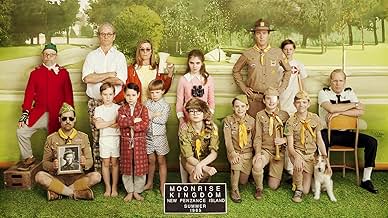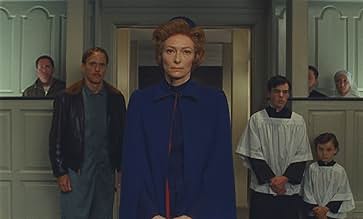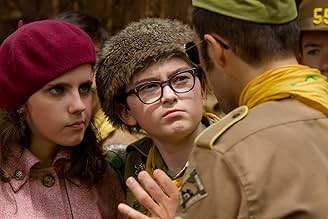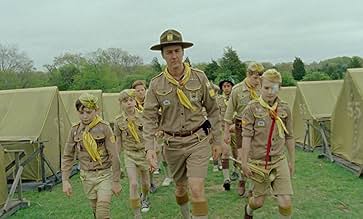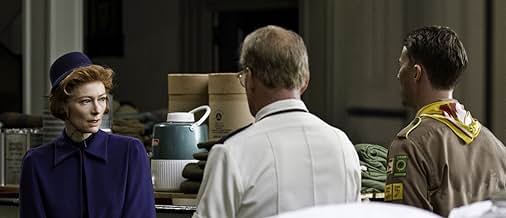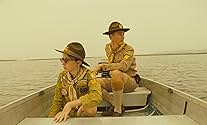Un paio di giovani amanti scappa dalla propria città del New England, ed un gruppo di persone tenta di trovarli.Un paio di giovani amanti scappa dalla propria città del New England, ed un gruppo di persone tenta di trovarli.Un paio di giovani amanti scappa dalla propria città del New England, ed un gruppo di persone tenta di trovarli.
- Candidato a 1 Oscar
- 36 vittorie e 121 candidature totali
Robert Hadlock
- Deluca
- (as Rob Campbell)
Recensioni in evidenza
Saw this just now in a small indie cinema in Heidelberg, Germany and I have to say, it was a romp. In my humble opinion this film manages to be both Wes Anderson's funniest picture so far and his most melancholic. The utter uncompromising stylishness of his other work is also present here, perhaps even heightened, but in contrast to The Life Aquatic (and to a certain degree The Darjeeling Limited), the emphasis here is firmly on plot. The brave and often odd visuals never overwhelm the story and the audience never feels like they are not quite in on the joke, like in The Life Aquatic. The tone does tend to become a bit erratic, especially in the last third of the film when Anderson seems to want to pack so much into every frame that the film becomes a bit cartoonish at times (hence the not-perfect score from me). All in all, though, the plot is very balanced and the pacing is great. The two young leads are superb and the brave move by Anderson to place unknown actors front and centre pays off beautifully. The rest of the cast is on paper even more star-studded than The Royal Tenenbaums and yet Anderson never steers into unnecessary character development just to accommodate his stars. A touch here and a touch there are more than enough to paint a picture of a group of people who are eerily similar in their dissatisfaction with their lives and yet react quite differently to the two young lovers' dash (literally) for happiness. In conclusion, a must-see for Anderson fans and highly recommended for everyone else.
In the past, Anderson has whirled us from melancholy dreamscapes set deep below the Pacific to tales of inter-generation betrayals in the name of love, from doomed romances in Paris hotels to deliriously bizarre animal revolutions in the English countryside. But for all the retro-stylings his films so proudly wear, Moonrise Kingdom is Anderson's first period piece - a tender love story set in the sepia-soaked sixties of Anderson's youth that have worked their influence into every one of his movies. It is fitting that this film is his most childlike - not in any way any simpler than his other films (as anyone with an accurate memory of childhood will remember all it's complexities; the way each trivial thing became a nest of thorns), but an accurate and deeply heartfelt depiction of childhood. It is not aiming to be as crushingly dramatic as Life Aquatic or as deeply tragic as Hotel Chevalier, because that wouldn't be appropriate for the story it's trying to tell. Instead, while still bearing Anderson's still surprising streak of black humour (some acts of violence really catch you off-guard; then again, children are violent so hats off Wes), it is largely concerned with the dramas and tragedies of youth. Yes, it is less ambitious than say The Life Aquatic but it also has none of the flaws that that film does (and believe me, I am a massive Steve Zissou fan). Instead, it is perfectly executed, wonderfully acted poignant beauty, with fantastic performances across the board (especially from newcomers Gilman and Hayward). This, while not his most ambitious, is certainly Anderson's most perfect work so far. You owe it to yourself to see this movie.
The thing that I enjoy most about Wes Anderson films is that they each feel like a great adventure and in this sense I think Moonrise Kingdom is his best yet. It tells that tale of Sam, an orphan on scout camp, and Suzy, a misunderstood girl, as they run away together. At first I found the two actors playing the kids to be kind of limp but after a few minutes I warmed to them and I actually think they were both pretty good overall, particularly Jared Gilman who plays Sam and even more so knowing that it's the first acting he's ever done. The rest of the cast are all pursuing or helping them in some way and there a couple of sub-plots with the island's policeman (played by Bruce Willis) and the parents of Suzy (Bill Murray and Frances McDormand).
I thought that the rest of the cast was great. In fairness I am a bit biased because I love Bill Murray, Edward Norton, Bruce Willis and Frances McDormand but even so I have to say that they were all really good, especially Edward Norton who plays the scout master, and Bill Murray. There are also a couple of minor roles for Jason Schwartzman, Harvey Keital and Tilda Swinton who were also a lot of fun. Everyone in the cast fits into their role really well which is obviously exactly what you want, but not only is that the case for the main roles but also for the less important ones, like the scout troupe (especially Sam's 'enemy'), Suzy's three brothers or the oddball narrator.
Cinematography wise I didn't think this movie was particularly spectacular, especially in comparison to other Wes Anderson movies like 'The Life Aquatic' or 'The Royal Tenenbaums'. There were a couple of shots that were cool though, some really long zoom outs (which sounds clichéd but it worked) and the doll house type ones that I love and think are awesome.
I wouldn't expect to wet your pants laughing at any moment in 'Moonrise Kingdom' but it is funny. There are a couple of laugh out loud moments and as a whole the jokes are pretty sharp and intelligently done. The reason I like the humour in this movie is that it's a part of the ambiance and feel of it, it won't make you crack up but it will make you have a smile on your face for pretty much the whole thing and leave you feeling strangely happy.
That kind of ambiance is really why the movie is so good, and is possibly Wes Anderson's best movie. The whole story is this fantastic blend of reality and child-like dreaming and it's wonderful. At times I felt kind of nostalgic and sad that I'm not a kid anymore. On the other hand it feels like a tribute to those myths and dreams of being a child and it works so well. This is the kind of film that I feel I could watch over and over again, each time spotting something new but also feeling good and enjoying the overall purpose.
Definitely go and see it!
I thought that the rest of the cast was great. In fairness I am a bit biased because I love Bill Murray, Edward Norton, Bruce Willis and Frances McDormand but even so I have to say that they were all really good, especially Edward Norton who plays the scout master, and Bill Murray. There are also a couple of minor roles for Jason Schwartzman, Harvey Keital and Tilda Swinton who were also a lot of fun. Everyone in the cast fits into their role really well which is obviously exactly what you want, but not only is that the case for the main roles but also for the less important ones, like the scout troupe (especially Sam's 'enemy'), Suzy's three brothers or the oddball narrator.
Cinematography wise I didn't think this movie was particularly spectacular, especially in comparison to other Wes Anderson movies like 'The Life Aquatic' or 'The Royal Tenenbaums'. There were a couple of shots that were cool though, some really long zoom outs (which sounds clichéd but it worked) and the doll house type ones that I love and think are awesome.
I wouldn't expect to wet your pants laughing at any moment in 'Moonrise Kingdom' but it is funny. There are a couple of laugh out loud moments and as a whole the jokes are pretty sharp and intelligently done. The reason I like the humour in this movie is that it's a part of the ambiance and feel of it, it won't make you crack up but it will make you have a smile on your face for pretty much the whole thing and leave you feeling strangely happy.
That kind of ambiance is really why the movie is so good, and is possibly Wes Anderson's best movie. The whole story is this fantastic blend of reality and child-like dreaming and it's wonderful. At times I felt kind of nostalgic and sad that I'm not a kid anymore. On the other hand it feels like a tribute to those myths and dreams of being a child and it works so well. This is the kind of film that I feel I could watch over and over again, each time spotting something new but also feeling good and enjoying the overall purpose.
Definitely go and see it!
Greetings again from the darkness. Not many people think like Wes Anderson. That's probably a good thing in real life. It's definitely a good thing for movies. He is a creative and distinct filmmaker, though not one with mass appeal. My two personal favorites of his are The Royal Tenenbaums and Rushmore. His previous film, Fantastic Mr Fox, was a solid hit and critically lauded. Now he delivers one that will probably only click with his core fans. It's a thing of beauty ... if you keep in mind that beauty is in the eye of the beholder.
Set on the fictional New Penzance Island off the coast of New England in 1965, the movie opens with terrific visuals of the Bishop family's lighthouse/home. Our tour is conducted as if the home were a dollhouse, and our eyes struggle to keep up with the detailed decor. We are struck by the color palette of tans, greens and splashes of red. This will continue throughout the movie.
The story centers around two 12 year old misfits: Sam and Suzy. Sam is an orphan and outcast in his Khaki Scouts troop, and Suzy is misunderstood and ignored by her selfish parents, who communicate with a bullhorn and through legalese at bedtime (they are both lawyers). Sam and Suzy are attracted to each other's misery and decide to run away together. This ignites a flurry of activity on this quiet island and showcases two first time actors with remarkable screen presence: Jared Gilman (Sam) and Kara Hayward (Suzy).
The "grown-ups" on the island include Suzy's parents played by Bill Murray (a Wes Anderson staple) and Frances McDormand. The island police chief is played Bruce Willis, who we soon figure out is also a social outcast. The Scoutmaster is played by Edward Norton in a regimented weirdness that will have you laughing in confoundment. For such serious topics, Mr. Anderson and co-writer Roman Coppola provide us many comedic moments - both through dialogue and site gags.
During the search, other colorful supporting characters get involved. Social Services is after Sam. Tilda Swinton plays Social Services. In one of the few gags, I'll give away, Swinton's character only introduces herself as Social Services. This is a gut punch to a system that is often under-staffed and forgetful of it's true mission. We also get Jason Schwartzman as a very helpful, though slightly seedy, Cousin Ben. Harvey Keitel plays the senior Scoutmaster who is unhappy with Norton for losing a scout. Bob Balaban makes periodic appearances as a narrator ... either for a documentary or for the movie, depending on the moment's need.
The script does a wonderful job of capturing how the 12 year old brain works. Some of the scenes with Sam and Suzy are almost like looking a photo album ... exactly the way our childhood memory works. Flashes of moments. The Alexandre Desplat score is heavy on percussion, but it works well with the minimalistic look of the film. It's also interesting to note that this is one of the few movies where it makes sense to have a soundtrack with Benjamin Britten, Hank Williams and Mozart! If you go to this one, keep your eyes open and moving, and your ears receptive. The payoff is worth it.
Set on the fictional New Penzance Island off the coast of New England in 1965, the movie opens with terrific visuals of the Bishop family's lighthouse/home. Our tour is conducted as if the home were a dollhouse, and our eyes struggle to keep up with the detailed decor. We are struck by the color palette of tans, greens and splashes of red. This will continue throughout the movie.
The story centers around two 12 year old misfits: Sam and Suzy. Sam is an orphan and outcast in his Khaki Scouts troop, and Suzy is misunderstood and ignored by her selfish parents, who communicate with a bullhorn and through legalese at bedtime (they are both lawyers). Sam and Suzy are attracted to each other's misery and decide to run away together. This ignites a flurry of activity on this quiet island and showcases two first time actors with remarkable screen presence: Jared Gilman (Sam) and Kara Hayward (Suzy).
The "grown-ups" on the island include Suzy's parents played by Bill Murray (a Wes Anderson staple) and Frances McDormand. The island police chief is played Bruce Willis, who we soon figure out is also a social outcast. The Scoutmaster is played by Edward Norton in a regimented weirdness that will have you laughing in confoundment. For such serious topics, Mr. Anderson and co-writer Roman Coppola provide us many comedic moments - both through dialogue and site gags.
During the search, other colorful supporting characters get involved. Social Services is after Sam. Tilda Swinton plays Social Services. In one of the few gags, I'll give away, Swinton's character only introduces herself as Social Services. This is a gut punch to a system that is often under-staffed and forgetful of it's true mission. We also get Jason Schwartzman as a very helpful, though slightly seedy, Cousin Ben. Harvey Keitel plays the senior Scoutmaster who is unhappy with Norton for losing a scout. Bob Balaban makes periodic appearances as a narrator ... either for a documentary or for the movie, depending on the moment's need.
The script does a wonderful job of capturing how the 12 year old brain works. Some of the scenes with Sam and Suzy are almost like looking a photo album ... exactly the way our childhood memory works. Flashes of moments. The Alexandre Desplat score is heavy on percussion, but it works well with the minimalistic look of the film. It's also interesting to note that this is one of the few movies where it makes sense to have a soundtrack with Benjamin Britten, Hank Williams and Mozart! If you go to this one, keep your eyes open and moving, and your ears receptive. The payoff is worth it.
Moonrise Kingdom (2012)
*** 1/2 (out of 4)
Teenager love birds Sam (Jared Gilman) and Suzy (Kara Hayward) run away from their homes to find a better life together but soon a search party is out looking for them. Wes Anderson's latest picture is quite a gem because it's been a very long time since a film has captured the innocence and beauty of young love. Now this certainly isn't a love story but then again the film is so original that it really doesn't fit into any one genre. There's the love stuff but also plenty of great comedy and best of all are the terrific performances from the entire cast, many of which haven't done this good of work in years. Anderson and Roman Coppola's screenplay is so simple yet so beautiful and innocent that it's nearly impossible not to get caught up in this crazy world. The visual style of Anderson is certainly on full display as is the weird and surreal atmosphere that really makes you feel as if you're seeing some sci-fi movie because it just appears to be a different universe than anything you've seen or known. At just 84-minutes without the end credits, there's really no filler or scenes that don't belong. This is a very tight ship that tells its story, gets the characters developed and then moves on. Both Gilman and Hayward are terrific in the roles of the young lovers and it's easy to see that they've both got a great talent and Anderson exploits every bit of it. The comic touch by the two was very impressive and they fit Anderson's world perfectly. Frances McDormand and Bill Murray are both extremely funny as the girl's parents and especially Murray who can play weird like no one else. Edward Norton turns in his best work in years as the scout leader and we even get a strong bit by Tilda Swinton. Harvey Keitel pops up towards the end and it's always great seeing him. Bruce Willis is the one that really jumps off the screen. I remember PULP FICTION brought him back to life in regards to showing he could "act" and didn't have to always play Bruce Willis and this film proves the same. Willis is extremely good, funny and at times touching in his part and it was great to see him acting again. MOONRISE KINGDOM isn't going to be a film for those seeking brainless action but those who want something more are bound to be entertained.
*** 1/2 (out of 4)
Teenager love birds Sam (Jared Gilman) and Suzy (Kara Hayward) run away from their homes to find a better life together but soon a search party is out looking for them. Wes Anderson's latest picture is quite a gem because it's been a very long time since a film has captured the innocence and beauty of young love. Now this certainly isn't a love story but then again the film is so original that it really doesn't fit into any one genre. There's the love stuff but also plenty of great comedy and best of all are the terrific performances from the entire cast, many of which haven't done this good of work in years. Anderson and Roman Coppola's screenplay is so simple yet so beautiful and innocent that it's nearly impossible not to get caught up in this crazy world. The visual style of Anderson is certainly on full display as is the weird and surreal atmosphere that really makes you feel as if you're seeing some sci-fi movie because it just appears to be a different universe than anything you've seen or known. At just 84-minutes without the end credits, there's really no filler or scenes that don't belong. This is a very tight ship that tells its story, gets the characters developed and then moves on. Both Gilman and Hayward are terrific in the roles of the young lovers and it's easy to see that they've both got a great talent and Anderson exploits every bit of it. The comic touch by the two was very impressive and they fit Anderson's world perfectly. Frances McDormand and Bill Murray are both extremely funny as the girl's parents and especially Murray who can play weird like no one else. Edward Norton turns in his best work in years as the scout leader and we even get a strong bit by Tilda Swinton. Harvey Keitel pops up towards the end and it's always great seeing him. Bruce Willis is the one that really jumps off the screen. I remember PULP FICTION brought him back to life in regards to showing he could "act" and didn't have to always play Bruce Willis and this film proves the same. Willis is extremely good, funny and at times touching in his part and it was great to see him acting again. MOONRISE KINGDOM isn't going to be a film for those seeking brainless action but those who want something more are bound to be entertained.
Wes Anderson Films as Ranked by IMDb Rating
Lo sapevi?
- QuizThe dance scene on the beach was saved for the very end of filming, so that the two young leads would be comfortable around each other, and was done on a closed set (just the two leads, co-writer and director Wes Anderson, and the cameraman).
- BlooperThe pilot of the plane incorrectly says the word "five" as "fiver". In standard aviation phonetics--NATO alphabets--the number "nine" is pronounced "niner", to distinguish it from "five", which is pronounced as "fife".
- Curiosità sui creditiDuring the final credits, Alexandre Desplat's music is vocally decomposed, like it was for the piece of classical music during the movie.
- ConnessioniFeatured in At the Movies: Cannes Film Festival 2012 (2012)
- Colonne sonoreThe Young Person's Guide to the Orchestra, Op. 34: Themes A.-F.
(1946)
Composed by Benjamin Britten
Performed by New York Philharmonic
Conducted by Leonard Bernstein
Narrated by Henry Chapin (uncredited)
I più visti
Accedi per valutare e creare un elenco di titoli salvati per ottenere consigli personalizzati
24 Frames From Wes Anderson Films
24 Frames From Wes Anderson Films
Explore the memorable career of Wes Anderson through 24 stills from his movies.
Dettagli
- Data di uscita
- Paese di origine
- Siti ufficiali
- Lingua
- Celebre anche come
- Moonrise Kingdom. Un reino bajo la luna
- Luoghi delle riprese
- Fort Wetherill State Park, Jamestown, Rhode Island, Stati Uniti(moonrise kingdom cove)
- Aziende produttrici
- Vedi altri crediti dell’azienda su IMDbPro
Botteghino
- Budget
- 16.000.000 USD (previsto)
- Lordo Stati Uniti e Canada
- 45.512.466 USD
- Fine settimana di apertura Stati Uniti e Canada
- 522.996 USD
- 27 mag 2012
- Lordo in tutto il mondo
- 68.298.842 USD
- Tempo di esecuzione1 ora 34 minuti
- Colore
- Mix di suoni
- Proporzioni
- 1.85 : 1
Contribuisci a questa pagina
Suggerisci una modifica o aggiungi i contenuti mancanti

Divario superiore
What is the streaming release date of Moonrise Kingdom - Una fuga d'amore (2012) in Canada?
Rispondi






